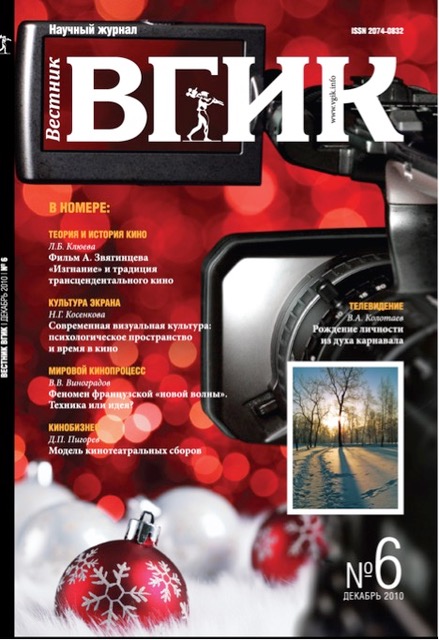Рождение личности из духа карнавала
- Авторы: Колотаев В.А.1,2, Kolotayev V.A.3
-
Учреждения:
- РГГУ
- Государственный институт искусствознания
- Выпуск: Том 2, № 4 (2010)
- Страницы: 100-110
- Раздел: ТЕЛЕВИДЕНИЕ | ЦИФРОВАЯ СРЕДА
- URL: https://journals.eco-vector.com/2074-0832/article/view/15080
- DOI: https://doi.org/10.17816/VGIK24100-110
- ID: 15080
Цитировать
Полный текст
Аннотация
Карнавальная модель культуры ММ. Бахтина организует медийное пространство мультсериала «Саут-Парк». Такие атрибуты народной смеховой культуры, как фамильярная жестикуляция, табуированная лексика, гипертрофированная сексуальность, обращенность к телесно-низовой символике, гротеск, а также карнавальное осмеяние образов официального «верха», лежат в основе художественного мира «Саут-Парка». Однако создатели мультсериала вносят в бахтинскую модель принципиальные изменения. Если классический карнавал усиливал иерархическую систему власти и укреплял коллективное начало, то мультсериал через осмеяние ценностей массовой культуры способствует ослаблению инстинктов толпы и рождению рефлектирующей личности, отстраненной от цен ностей любой идеологии. Анализ некоторых серий «Саут-Парка» показал, что в медийном пространстве массовой культуры происходит формирование новых моделей идентичности, которые получают широкое распространение не только в голливудском кино, но и в сфере политики и социальных отношений.
Ключевые слова
Об авторах
Владимир Алексеевич Колотаев
РГГУ;Государственный институт искусствознания
Email: kolotaew@mail.ru
доктор филологических наук, профессор учебно-научного центра ПРЕЗЕНТАЦИЯ АВТОРОВ I SUMMARY«История и экранная культура» факультета истории искусстваведущий научный сотрудник отдела теории искусства; РГГУ;Государственный институт искусствознания
Vladimir Alexeyevich Kolotayev
Список литературы
- Anderson В. С. South Park Conservatives: The Revolt Against Liberal Media Bias. Washington, 2005.
- Cantor P.A. The invisible gnomes and invisible hand: South Park and the libertarian philosophy // South Park and Philosophy: You Know, I Learned Something Today. Ed. by Robert Arp. Maiden, 2007. Pp. 97-111.
- Curtis D.V.,Erion G.J. Defending democracy through satire //South Park and Philosophy: You Know, I Learned Something Today. Ed. by Robert Arp. Maiden, 2007. Pp. 112-120.
- Gray J.S. «Vote or Die, Bitch» - The myth that every vote counts and the pitfalls of a two-party system // South Park and Philosophy: You Know, I Learned Something Today. Ed. by Robert Arp. Maiden, 2007. Pp. 121-128.
- Gournelos T. Puppets, Slaves, and Sex Changes: Mr. Garrison and South Park's Performative Sexuality // Television & New Media. 2009. Vol. 10, No. 3. Pp. 270-293.
- South Park and Philosophy: You Know, I Learned Something Today. Ed by Robert Arp. Maiden, 2007.
- Samuel R. Freud goes to South Park. Teaching against postmodern prejudices and equal opportunity hatred // Taking South Park Seriously. State University of New York Press, Ed. by Weinstock J. A. Suny Press 2008. Pp. 99-112.
- Hanley R. (Editor). South Park and Philosophy: Bigger, Longer, and More Penetrating (The Blackwell Philosophy & Pop Culture Series). Illinois, 2007.
- Johnson-Woods T. Blame Canada!: South Park And Popular Culture. NY, 2007.
- Weinstock J. A. Taking South Park Seriously. State University of New York Press, Suny Press 2008.
- Greening S. Cynicism and Other Postideological Half Measures in South Park // Taking South Park Seriously. Weinstock Jeffrey Andrew (Editor). State University of New York Press, 2008. Pp. 113-129.
- Halsall A. Biger, longer and uncut. Souht Park and the carnivalesque // Taking South Park Seriously. Weinstock Jeffrey Andrew (Editor). State University of New York Press, 2008.
- The Simpsons and Philosophy: The D'oh! of Homer (Popular Culture and Philosophy) by William Irwin, Mark T. Conard, and Aeon J. Skoble. Chicago: Open Court, 2001.
- Devlin W.L. The philosophical passion of the Jew: Kyle the philosopfer //South Park and Philosophy: You Know, I Learned Something Today. Ed. by Robert Arp. Maiden, 2007. Pp. 87-94.
- Dueck G. Religious pluralism and The super best friends // South Park and Philosophy: You Know, I Learned Something Today. Ed. by Robert Arp. Maiden, 2007. Pp. 224-235.
- Fry К Oh my god! They Killed Kenny... Again: Kenny and Existentialism // South Park and Philosophy: You Know, I Learned Something Today. Ed. by Robert Arp. Maiden, 2007. Pp. 77-86.
- Arp R. The Chewbacca defense: A «South Park» logic lesson // South Park and Philosophy: You Know, I Learned Something Today. Ed. by Robert Arp. Maiden, 2007. Pp. 40-54.
- Jensen R.M. Awesom-o and the possibility and implications of artificial intelligence // South Park and Philosophy: You Know, I Learned Something Today. Ed. by Robert Arp. Maiden, 2007. Pp. 189-201.
- Biderman S. Stan's future and evil Cartman: Personal identity in «Sauth Park» // South Park and Phihsophy: You Know, I Learned Something Today. Ed. by Robert Arp. Maiden, 2007. Pp. 202-210.
- Savage, William J., Jr. ""So Television's Responsible!': Oppositionality and the Interpretive Logic of Satire and Censorship in The Simpsons and South Park" Leaving Springfield: The Simpsons and the Possibility of Oppositional Culture. Ed. John Alberti. Detroit: Wayne State University Press, 2004. Pp. 197-224.
Дополнительные файлы








